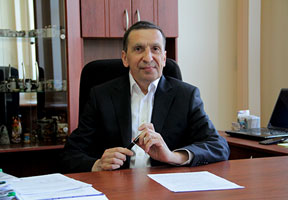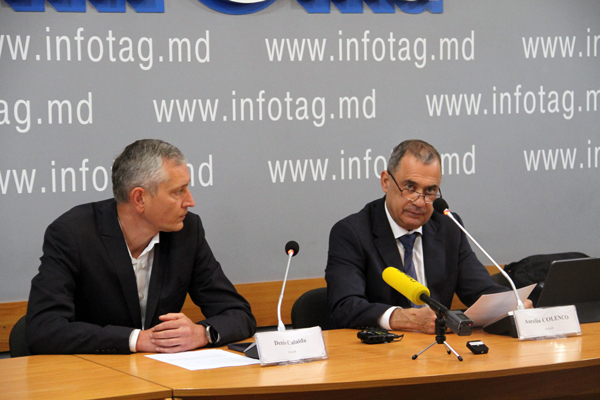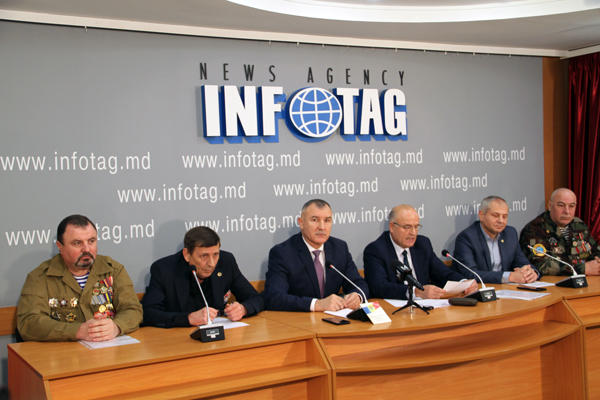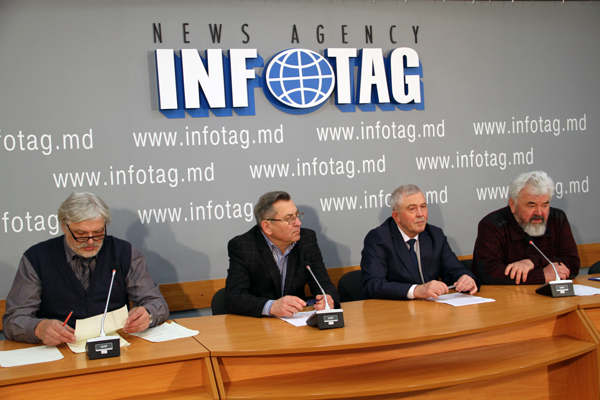Interview
FINCOMBANK: MISSION FEASIBLE!

The shareholders and managers of the FinComBank of Moldova realize what kind of bank they want to have and know who its main customers are. “We don't wish to be there where we don't understand things”, says the Chairman of FinComBank’s Board, Mr. Victor Hvorostovschii, who gave an interview to Infotag News Agency’s Director, Mr. Alexander Tanas on the issue of FinComBank’s development strategy for the period 2017-2020.
Question: Mr. Hvorostovschii, for more than 30 years of your banker’s experience, do you recall a similar situation on the market experienced by Moldovan banks?
Answer: I presume that every 3-5 years on the Moldovan financial market appears something that has never been registered before, or at least something we have not come across closely. What the Moldovan banking system is experiencing nowadays is something we have never seen on the market: required reserves – 40%, liquidity – 50%! But even with the high liquidity like FinComBank has, not every bank can boast of having considerable free available funds. We, for example, do not have it.
Q: Can you notice a demand for new loans?
A: We have quite a lot of applications. I think that if we were able to meet all of them, the bank’s credit portfolio would soar! The bank is mainly engaged in lending to micro- and small businesses, as well as individuals. Our preferences are issuing the loans in the amount from 1 million to 3 million lei. The average amount does not usually exceed 300,000 lei. Therefore, the loans in amount of 10-25 million lei are quite rarely issued by our bank and mostly to such customers we collaborate with for 10-15 years.
Q: Is this a principled position?
A: You know, our bank was hard hit due to “non performing loans” in 2007, 2008, 2009. And in 2010, for the first time in its history, FinComBank have registered losses, having written off about 100 million lei. These were mostly large, investment loans, and we are still trying to sell the collateral received within some of them. Therefore, at the level of shareholders and management, we decided that it is necessary to leave this niche that requires servicing of large customers, due to the fact that such an activity is fraught with risks. There are large banks in our country, so we do not wish this at the current stage of our bank's development.
Q: The Regulator [National Bank of Moldova] cites the example of FinComBank when talking about retail. What does it mean?
A: First of all, I should remark that this is a totally different technology related to the organization of processes, loans issuance, monitoring, business analysis. We are grateful to our partner from Germany, the European Fund for Southeast Europe (EFSE), which we have been cooperating with for many years, solving the task of reformatting the bank. They invited a number of consulting companies from Switzerland and Germany in order to change the FinComBank’s image and structure and to re-locate it to a new for the bank market segment.
Our portfolio has reached 1.17 billion lei. In the first quarter of 2017, the volume of new loans, issued by FinComBank amounted to 440 million lei. If we compare, issuing loans at such pace would have formed an annual portfolio of 1.7 billion lei. This indicates a good loan turnover, an average of 9-10 months. I guess any bank would envy this.
As concerns the FinComBank’s development strategy, we initially had a commitment to ensure that 10% of our portfolio will consist of micro-loans. Then, we set a goal to allocate 10% for micro lending and 10% for individuals. Yet later, we raised the bar up to 20% - for loans and 20% - for the retail. And now the bank is coming close to achieving this goal. It seems that we will be able to increase these indicators, say, up to 25-30%.
Q: Where did you find personnel to ensure this new direction, in particular, the FinComBank’s presence in every locality of Moldova?
A: It is noteworthy, that the staff number did not particularly increase. Moreover, we increased the network of our regional offices from 48 up to 100 of sales points. We are on the 4th place, after Moldova Agroindbank, Moldindconbank and Victoriabank on this indicator. The staff number had to be expanded by 40-50 employees, solving the problem of personnel by means of the bank’s employees reprofiling. Presently, even cashiers, who previously used only to count cash, now are engaged in selling our banking products.
We have managed this task, although, honestly, it was difficult due to a wild size personnel shortage. After we have trained a person to become a real specialist, he dismisses because of moving abroad or getting another job. If we had enough well-trained employees, we would have opened 150 and even 200 of sales points across the country.
Q: Does microloans are issued with no collateral within the FinComBank’s sales points?
A: Up to a certain amount – with no collateral, and above this amount – with collateral.
Q: This may be risky. To what extent such massive lending affects the portfolio quality?
A: Its indicator is between 0.7% and 7%. In aggregate for the bank this indicator is standing at 2.6%.
Q: It’s a remarkable indicator against the background of the banking system’s average figure of 16%.
A: Yes we know, and I have already recommended our employees to play safe and to transfer a part of loans into the 3rd category so as not to stand out with too enviable portfolio quality.
Q: Does it happen that in such lending activity the “banking sieve” does not let to pass the “unnecessary fractions” resorting to refusal?
A: It happens! Well, first of all, the bank has an efficient Internal Risks Department, which is in direct subordination of the Chairman of the Board and reports to the bank’s Administrative Council. Its members have the right to veto all decisions taken by the Board and, thus, being able to block any of them. At a slightest disagreement with the Internal Risks Department, the decision is blocked.
Secondly, we have an understanding of what we want, what we need today and where we should be. We don't wish to be there where we don't understand something. For example, we don’t want to participate in a construction, say, of an industrial enterprise of the economic importance, if we don't see the importance of such an investment for the bank. For such type of investments, you need to have the qualified specialists, but we don't have such experts. Those banks that can afford employing such specialists or have the opportunity to attract them from other places, well, let them run such investments.
As for us, we went where there is no need for large investment knowledge for business assessment and more are needed knowledges in psychology, mathematics, lending processes. The FinComBank’s employees have already passed the painful transition to micro-lending activity. On issuing of such loans there are no usual business plans or balances required from borrowers. Here, the borrower just brings a battered notebook with the figures of his expenses, sales and acquisitions. We offer to him money on condition of its targeted use, though the borrower receives cash, and it is difficult to monitor.
When we were only at the beginning of such lending activity, the bank had 15 branches, and many of its managers were afraid to issue such loans due to the risk of criminal liability in case of non-repayment of debt. But there were the brave 5-6 managers who took the risk of launching the activity of lending with no collateral. Their results inspired the rest, and they were followed by all managers of FinComBank’s divisions.
Q: At what period did you start that?
A: I should say that our large shareholder, the Western NIS Enterprise Fund (USA), had always insisted on such lending. And we saw that, yes, we should start doing that in earnest. Together with the Fund, we reformatted the bank, by visiting Belarus and Ukraine to gain the experience in the banks in which the shareholder had a participation in capital. The fund had always put emphasis on the portfolio diversification. I well remember that banks in Kiev and Minsk were saying that “this is possible” and that “such structure and methodology of lending have been tested and are working efficiently”.
Q: How justified is the existence of the Internal Risks Department within FinComBank?
A: I just cannot imagine what kind of a bank we could be without such a department, taking into account the increased requirements for risk management. It would resemble a car without brakes. Our Board always agrees with remarks of the Department employees or looks for compromises. The Chairman of the Board cannot influence the issuance of any loan. I am not a member of the Credit Committee, or of the Assets and Liabilities Management Committee, or of the Risk Management Committee. I have been deprived of all this so that I, as a leader, had no influence on making decisions related to additional risks.
Q: What else is stated in the FinComBank’s development strategy for 2018-2020?
A: We see that people come to the bank for the first time to open its doors and talk to the manager, and then they leave the bank to use the remote banking services. The Strategy stipulates, first, providing services to customers through the 100 of FinComBank’s sales offices. We have achieved the covering of all Moldovan localities and the physical presence of the bank throughout the country.
Q: How many customers prefer to use the remote banking services instead of visiting the bank’s offices?
A: Presently, 75-80% of legal entities are using the remote banking services, therefore the bank’s operating halls are not so crowded. With the bank’s assistance and support, all customers are switching to the convenient remote banking services. Approximately the same level we are planning to achieve with the individuals, so that 80% do not need to come to the bank. We offer them the software FinComPay, and FinComBank becomes accessible everywhere. The customers have the opportunity to use the entire list of FinComBank services. Parallel to this, is solving the issue of strengthen by the personnel of already opened sales offices and of their sustainable development.
That’s why the second strategic direction of FinComBank’s development is Online Banking. Using this service, our customers have the bank at hand – at home, in the office, abroad. With this direction, we are successfully solving the task of customer servicing diversification.
Q: How many customers are serviced by FinComBank?
A: More than 100,000 of active customers.
Q: Are all FinComBank’s sales offices cost effective?
A: About 15% of 100 sales offices report losses. We are working on this, figuring out whose omissions and faults are – manager’s, or may be due to inappropriate office location? For example, at present, we have approached to the solution of this task in Taraclia. The bank acquired a large agency owned before by Banca Sociala. We found and invited its former employees, who are well aware of the situation in the city and the locality, so, now they restoring the business that existed at the said bank office in the past.
By the way, some people keep saying that there are too many banks in Moldova. But I believe there is enough place under the sun for all banks. Look how efficiently the leasing and financial companies are developing! I believe that all entities will be in demand if only they will offer the demanded products. And if the national economy starts working to its full strength, then banks will need extra resources, a capital that will have to be attracted even from abroad. I am an optimist, so I believe and hope that we will pass over this rough patch for banks, related to money laundering and billion dollar theft from the Moldovan banking sector.
Q: The implementation term of Basel-3 standard is approaching. How much are the requirements on risk, capital, and management become tougher?
A: I will tell you about FinComBank. We made risk-based calculations for ourselves and carried out a special stress testing. The results showed that, in the worst case scenario the bank’s capital may decrease by 10% – i.e. by 30-35 million lei. Such an amount is not catastrophic and is absolutely imperceptible for the bank, so we will be able to comply with absolutely all norms set by the regulator. I hope that also for other banks, the new requirements will not seem dramatic or unrealizable.
Q: How do you think, what FinComBank will be like in 2020?
A: Concerning the quantitative figures, we will overcome the threshold of the bank’s market share of 5%. As for quality, we will be moving the bank towards automation of processes and comprehensive transition to Online Banking.
Q: We would like to learn your characteristics of a successful average FinComBank’s customer.
A: These are people who, through their labor, have achieved good results. I would say these are self-made people. I know these customers personally. At present, the value of their assets amounted to approximately 1 million euro. These are middle class people. By their labor, they have won a place under the sun in various spheres of economy, running their own private business. We, at FinComBank, provide such customers with facilities and support, especially in the start-up period. These are self-sufficient people, respecting themselves, and considering the bank as their partner, as well as understanding, that the bank has to obtain a profit too. We in our bank consider non-serious to start bargaining for a 0,03% discount.
Q: In your opinion, the share of such customers within Fincombank is increasing, falling, or it remains at the same position?
A: In conformity with statistics, their number remains at the same position. The number of such clients is not growing. There are some customers we’ve lost, but the number of new customers is not increasing.
Q: From the point of view of a banker with a 30-year work experience, what should happen in the country so that the number of such customers, in general and in FinComBank in particular, to be on the increase?
A: I think that the State and its authorities should not provide privileges and attractive conditions only for the foreign capital. It is necessary to create equally attractive conditions for all. When such conditions appear, the foreign investors will turn in line to enter the Moldovan market. We should think of investment climate in general and not exclusively for foreign investors. It is quite possible to do business in our country. Unfortunately, some people leave the country because they do not see any social prospects for themselves. There are those who emigrated, reside in the West, but doing business in Moldova. But recently there have appeared those who transfer assets to Romania, for example.
Q: The same can be said about the capital market. Are there not enough financial instruments on it?
A: Yes, I agree. It would be cynical, but, generally speaking, the population has no place to invest their money in. Thanks to the existence of 11 banks, there is competition for the population’s savings at the local market. As a result, the banks need to charge the optimal interest rates, keeping them closely tied to the current conditions on the market of deposits. Banks have the only possibility to obtain the liquidity - from the population’s savings. So, we find ourselves in inter-dependence: the population has no place to invest its savings, while the banks are short of money.
Q: As of 31.12.2016, the Moldovan economy grew up by 4.1%. Do you have a feeling that the stagnation is over?
A: No. I admit that assets have slightly increased, but the loan portfolio is still shrinking, however, much less. One of the reasons is that banks have become extremely cautious about lending, so as not to increase the share of non-performing loans.
I would say that the current value of fines, which can be applied by the Regulator to the bank’s managers, is sobering, sometimes even scaring. Its amount reaches significant values. One day, I decided to calculate, and found out that such a fine may reach the size of my earnings for 12 years of work. In such conditions, a bank needs the integrated insurance covering inter alia the errors of the manager. I am not talking about a fraud, I mean an error, which every human being can commit.
Q: Do you consider tight the regulation of the National Bank of Moldova, set after the 2014/15 crisis?
A: FinComBank has the following position in this regard: we will adapt and will carry out all that is necessary, but we need the reasonable terms for implementing the changes. In general terms, we are ready to comply with every request of Regulator. But only please give us time enough for this. Better or worse, but all banks will comply with the regulator's requirements.
And one more thing: it would be good to find the National Bank’s sparing approach to bank’s errors. Now the NBM has changed its attitude to commercial banks, and its regulation opportunities have significantly expanded. The NBM can swing its sabre once and cut everything off. But I think it’s better to forgive twice until the third non-compliance, if, certainly, this is not something criminal.
We perfectly understand that the Regulator is responsible for the entire banking system of the country. The Regulator possesses information at the macroeconomic level, there are the experienced external consultants, who, I hope, correctly advise the central bank.
Q: Is it realistic to forego the margin in order to reduce it to 3-3.5%, or the level of 5% is the limit?
A: Not at all. But if the margin level falls below 5%, this is already associated with risks. In principle, it can be reduced, but for this purpose, the bank should increase the volume of activity with non-interest-bearing products. i.e. it needs more customers. For this, however, it is necessary to have another economy and another business activity in Moldova. That’s why at the current stage such an opportunity seems rather a theoretical one.
Q: FinComBank invested a part of its resources in the securities, issued by the Ministry of Finance for cash buffer. Why didn’t banks agree to purchase securities payable in 3 years?
A: The fact is that for the cash buffer securities the fixed interest rate is applied. Thus, no one in our country knows which profitability it will bear in, say, 6 months, the more so in 3 years. That’s why banks preferred not to assume the risk, agreeing to invest in 2-year securities in order to support the issuer with its initiative on issuing a liquidity buffer for the budget in the amount of 2 billion lei. Everybody was contented that against these investments, banks will be able to receive financing from the NBM, if an urgent need arise.
In this case, it is necessary to take into account and to understand that banks attract resources for deposits for a period from 6 months to 1,5-2 years maximum. The population does not place deposits for three-years term, because it also does not know what will happen to the rate of their yield, what will be the national currency exchange rate.
Q: It is believed that the size of required reserves is influenced by the “hot money” of the system, which presses on inflation. Does FinComBank have such money?
A: We do not have such resources. If we had, we would be able to lower our interest rates, reducing the attraction of money from the population. On the contrary, we would like to attract about 100 million lei extra. Due to increase by the Regulator of the minimum size of required reserves up to 40%, the bank had to withdraw a part of resources, previously allocated for lending.
Q: Do you intend to please the shareholders of FinComBank by symbolic dividends for 2016?
A: We once again have applied to the Regulator for the permission to pay dividends. The Board provided all the calculations, indicating that even taking into account the compliance with the upcoming Basel-3 requirements, the bank could allocate the amount of 20 million lei for dividend payout. We are looking for NBM’s decision.
Q: How pleased was the FinComBank staff on the fact that Cristina Harea, a member of Administrative Board of FinComBank, had become the Deputy Governor of the NBM?
A: I will tell you sincerely: this is the third time in the bank’s history, which is making us more vigilant, in a certain sense of the word, creating an excessive precaution towards our bank. The first instance was with Mr. Ion Sturza, who, after being a Chairman of the FinComBank’s Board, became a Minister of Economy and then a Prime Minister. The second story was with Mr. Vladimir Voronin, when he became President of the Republic of Moldova. And now - Ms. Cristina Harea. In all cases, a slightly biased attitude towards the bank was noted. You know why? Only because, heaven forbid, anybody to be accused for the protectionism of FinComBank.
Infotag: Thank you very much Mr. Hvorostovschii for your interview.
























Add Comment